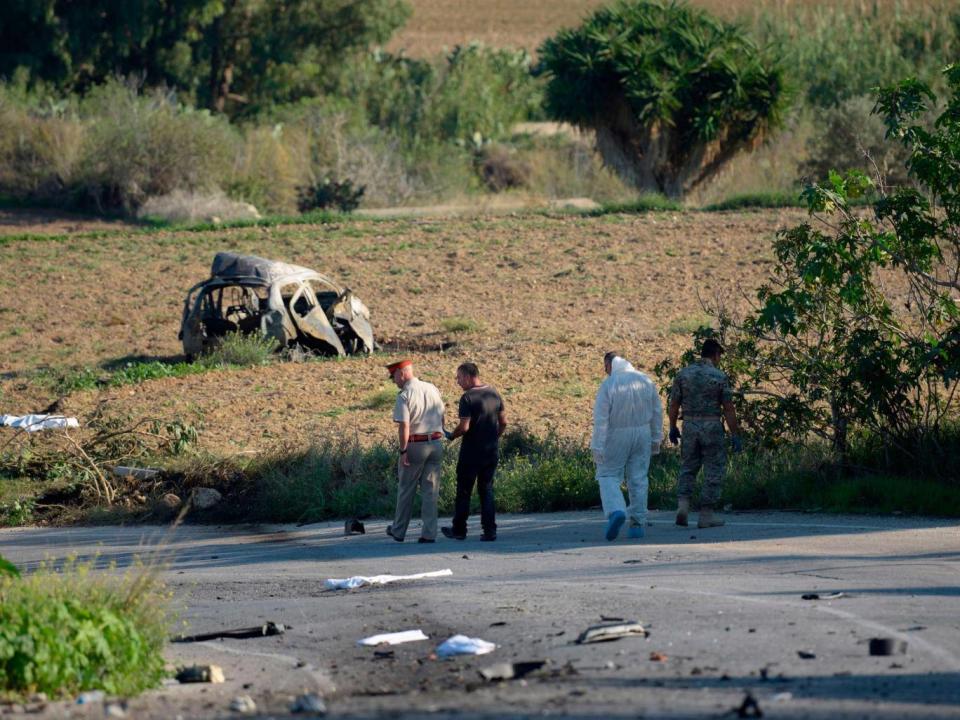Daphne Caruana Galizia: Malta offers €1m for information on car-bomb killing of Panama Papers journalist
Malta’s government is offering an “unprecedented” reward of €1m (£890,000) for information about who killed a prominent investigative journalist with a car bomb.
Authorities described the investigation into the murder of Daphne Caruana Galizia, whose reporting on corruption targeted the Prime Minister and other senior political figures, as “a case of extraordinary importance which requires extraordinary measures”.
The 53-year-old was killed last week when a remotely detonated bomb tore apart her car as she drove away from her home on the Mediterranean island.
Prime Minister Joseph Muscat had told his country’s parliament last week that the government would offer a “substantial” reward to anyone with information about the crime.
Ms Caruana Galizia regularly criticised Mr Muscat in her popular blogs, in which she relentlessly highlighted cases of alleged high-level corruption and targeted politicians across party lines, as well as prominent businesspeople.
Her family said they had been informed of the government’s plans for a reward but had refused to endorse it despite “unrelenting pressure from the President and Prime Minister of Malta”.
“We are not interested in justice without change,” her sons Matthew, Andrew and Paul said in a joint statement on Facebook. “Justice, beyond criminal liability, will only be served when everything that our mother fought for – political accountability, integrity in public life and an open and free society – replaces the desperate situation we are in.”

They added: “A government and a police force that failed our mother in life will also fail her in death. The people who for as long as we can remember sought to silence our mother cannot now be the ones to deliver justice.”
Her sons called on the Prime Minister to resign and said his last act before doing so should be to replace the Police Commissioner and the Attorney General for failing to act over their mother’s claims of corruption.
Senior European Union officials have denounced Ms Galizia’s murder as an attack on journalistic freedom and urged for rule of law to prevail in the tiny member nation.
The Maltese government has previously offered a reward in a bank heist case but this is believed to be the first time it has posted a reward in a murder investigation.
In the last decade there have been 15 Mafia-style bombings or similar attacks in Malta, and many of the crimes have gone unsolved.
In a statement, the government said it was “fully committed to solving the murder” and “bringing those responsible to justice”.
It also promised full protection for informants.
Ms Caruana Galizia had unearthed Maltese links to the Panama Papers leaks, and wrote that Mr Muscat’s wife had an offshore account that was used to move money from high-level figures in Azerbaijan. The Muscats denied having such an account and any wrongdoing.
Several other top officials, including a minister and Mr Muscat’s chief-of-staff, had launched libel suits against the journalist.
Her work on the explosive tax evasion case, which involved some of the richest and most powerful people in the world, prompted political news website Politico to hail her as a “one-woman Wikileaks, crusading against untransparency and corruption in Malta”.
FBI agents and Dutch forensic experts have been helping with the investigation.
A group of NGOs known as the Civil Society Network was planning to hold a national protest against the killing.
At 3pm on Monday, a week to the hour when Ms Galizia was murdered, Maltese Archbishop Charles Scicluna will hold a Mass in the mostly rural area where she died.

 Yahoo News
Yahoo News 